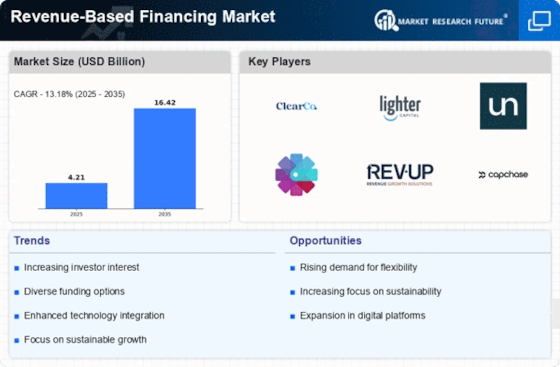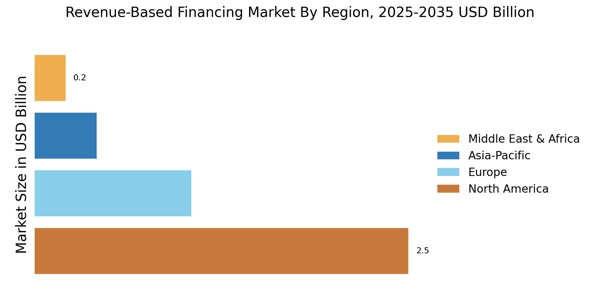Rise of E-commerce and Digital Platforms
The proliferation of e-commerce and digital platforms has significantly influenced the Revenue-Based Financing Market. As online businesses continue to flourish, they often require immediate capital to scale operations, enhance marketing efforts, and improve customer experience. Revenue-based financing aligns well with the cash flow patterns of e-commerce businesses, which may experience rapid revenue growth but also face seasonal fluctuations. Recent statistics suggest that e-commerce sales have surged, with projections indicating a potential increase of over 30% in the next few years. This trend creates a fertile ground for revenue-based financing, as it provides a viable funding option for e-commerce entrepreneurs. Consequently, the Revenue-Based Financing Market is poised to benefit from the ongoing digital transformation, as more businesses seek innovative financing solutions to support their growth trajectories.
Shift Towards Performance-Based Funding Models
The Revenue-Based Financing Market is witnessing a notable shift towards performance-based funding models. Investors and lenders are increasingly recognizing the value of aligning their returns with the success of the businesses they finance. This approach not only mitigates risk for investors but also incentivizes businesses to achieve higher revenue growth. As a result, revenue-based financing is becoming an attractive option for startups and established companies alike. Data indicates that performance-based funding models have gained traction, with a significant portion of new financing deals incorporating revenue-sharing agreements. This trend reflects a broader movement within the financial sector towards more equitable and sustainable funding practices. The Revenue-Based Financing Market is likely to continue evolving in response to this shift, as both investors and entrepreneurs seek mutually beneficial arrangements that foster long-term growth.
Increased Demand for Flexible Financing Solutions
The Revenue-Based Financing Market is experiencing heightened demand for flexible financing solutions, particularly among small and medium-sized enterprises (SMEs). Traditional financing methods often impose rigid repayment schedules, which can be detrimental to the cash flow of growing businesses. In contrast, revenue-based financing offers a more adaptable approach, allowing companies to repay based on their revenue performance. This flexibility is particularly appealing in dynamic market conditions, where businesses may face fluctuating income streams. According to recent data, the revenue-based financing sector has seen a growth rate of approximately 25% annually, indicating a robust shift towards this model. As more entrepreneurs seek alternatives to conventional loans, the Revenue-Based Financing Market is likely to expand further, catering to the evolving needs of businesses seeking sustainable financial solutions.
Increased Awareness of Alternative Financing Options
There is a growing awareness of alternative financing options among entrepreneurs and business owners, which is positively impacting the Revenue-Based Financing Market. As traditional lending avenues become more stringent, many businesses are exploring innovative funding solutions that do not require equity dilution or personal guarantees. Revenue-based financing stands out as a compelling alternative, offering a way for businesses to access capital without sacrificing ownership. Recent surveys indicate that a significant percentage of entrepreneurs are now considering revenue-based financing as a viable option for funding their ventures. This increased awareness is likely to drive further interest in the Revenue-Based Financing Market, as more businesses recognize the benefits of flexible repayment structures and the potential for sustainable growth without the constraints of conventional financing.
Supportive Regulatory Environment for Alternative Financing
The regulatory environment surrounding alternative financing is becoming increasingly supportive, which bodes well for the Revenue-Based Financing Market. Governments and regulatory bodies are recognizing the importance of fostering innovation in the financial sector, leading to the establishment of frameworks that facilitate alternative funding models. This supportive stance encourages the growth of revenue-based financing, as it provides a clearer pathway for businesses to access capital. Recent legislative changes in various regions have aimed to streamline the process for alternative lenders, making it easier for them to operate and offer competitive financing solutions. As the regulatory landscape continues to evolve, the Revenue-Based Financing Market is likely to benefit from enhanced legitimacy and increased participation from both investors and entrepreneurs seeking alternative funding avenues.

















